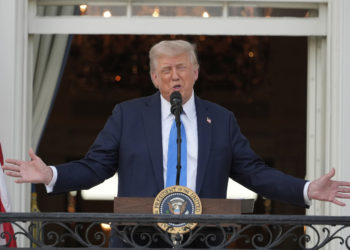Dollar daze
The outlook for the U.S. economy is continuing to deteriorate: On Tuesday, the Organization for Economic Cooperation and Development cut its growth forecast over heightened trade war concerns.
President Trump’s tariffs are expected to sock most countries this year and next, the O.E.C.D. said. But the hit to the United States is especially spooking economists and Wall Street, who worry about lower growth colliding with a Republican spending bill that packs big tax cuts — and gargantuan deficits, reports Bernhard Warner.
All of that is putting pressure on the dollar. It traded near a three-year low on Monday, as global investors weigh keeping their money invested in America.
The greenback could fall further. Analysts at Morgan Stanley see it tumbling about another 9 percent over the next 12 months, and JPMorgan Chase and Goldman Sachs have also made bearish calls in the past week.
Investors may not be ready to ditch the world’s reserve currency. But they are increasingly hedging their bets against U.S. assets, especially Treasury notes and bonds — which could hurt the dollar, Matthew Hornbach, global head of macro strategy at Morgan Stanley, told Bloomberg Television on Monday.
The Republican spending bill could bolster that exodus. The House version includes provisions that Wall Street is watching. One is Section 899, which would potentially tax some foreign investors’ holdings in the country. Another would charge a 3.5 percent surcharge on remittance payments by noncitizens, which has alarmed fintech companies.
The concern is that in trying to get foreign investors to plug some of America’s fiscal hole, it could push them to put their money elsewhere. The remittance tax could have the effect of “potentially disincentivizing capital flows into the U.S. rather than retaining them,” Monica Guerra, the head of U.S. policy at Morgan Stanley Wealth Management, wrote in a research note on Monday.
“The financial industry is actively engaged in efforts to narrow the scope consistent with congressional intent,” she added.
Watch the Senate this week — especially fiscal conservatives like Senator Ron Johnson of Wisconsin, who is insisting on deeper spending cuts. The Republicans cannot afford more than a few “no” votes. A stalemate over big line items could throw off the party’s hopes to get a bill passed and onto Trump’s desk before his personal deadline of July 4.
Cuts to Medicaid could be one fraught area. The administration has argued that coverage wouldn’t be at risk, and that it’s trying to address wasteful spending.
HERE’S WHAT’S HAPPENING
Major music labels reportedly close in on A.I. deals. Universal Music, Warner Music and Sony Music are negotiating licensing arrangements with two start-ups, Suno and Udio — deals that could rewrite how artists like Taylor Swift and Drake are compensated in the age of generative artificial intelligence, Bloomberg reports. The talks will be closely watched, since an industry trade group representing the labels has sued Suno and Udio for copyright infringement.
Meta goes nuclear to power its A.I. needs. The social media giant will buy 1.1 gigawatts of power from a Constellation Energy site in Illinois, a 20-year deal that removes questions about the plant’s uncertain future. Meta is the latest tech company to tap nuclear as a power source for artificial intelligence data centers, throwing a lifeline to the nuclear sector’s future.
Toyota seeks to take one of its companies private for $33 billion. The privatization of Toyota Industries, which makes textile looms and forklifts and was the original business of what’s now the world’s biggest carmaker, would be one of the biggest such buyouts, and give the conglomerate’s founding family more control. Shares in Toyota Industries ticked higher on Tuesday, even though the deal values the conglomerate below Tuesday’s market closing price.
The Musk businesses that are thriving
Elon Musk has declared that he’s back in the saddle at his many businesses, with his time as a special government employee over.
Analysts and some employees see that as a relief, given the setbacks facing Tesla and, to some degree, SpaceX. But other parts of Musk’s empire show signs of thriving.
The latest: xAI, the artificial intelligence start-up, is kicking off a $300 million secondary stock offering — in which employees will be allowed to sell their holdings to outside investors — at a $113 billion valuation, according to The Financial Times.
That valuation includes an appraisal of xAI at $80 billion, nearly double what it was valued at late last year. (The $113 billion factors in Musk’s X social network, which xAI bought in March at a $33 billion valuation.)
Separately, Musk’s Neuralink said that it had raised $650 million in funding — from investors including Founders Fund, Sequoia Capital and Thrive Capital — as its brain-implant devices undergo clinical trials. Semafor previously reported that the round would be completed at a $9 billion valuation, more than double what the company was worth in 2023.
Investors in other Musk businesses are hoping for more positive developments. Tesla especially has been under pressure worldwide, partly because of Musk’s increasingly polarized political brand. (The latest evidence: Tesla sales tumbled in much of Europe again last month.)
But some people linked to SpaceX — the Musk company that has arguably benefited the most from its founder’s ties to the Trump administration — have also called on the entrepreneur to spend more time there, according to The Times:
In May, Dylan Small, a former mechanic at the rocket company, posted on X that “morale is low” and “people are burned out.”
“Your presence used to drive a fire in the team,” Mr. Small wrote to Mr. Musk. “Please come back and walk the floor.”
In a message to The New York Times, Mr. Small said SpaceX’s work was largely the result of employees’ feeling “inspired,” with Mr. Musk playing “a huge role in that.”
Musk is already making a public show of his renewed commitment, having done news interviews about SpaceX (which is grappling with another failed rocket test), Tesla and posting publicly that he was spending “24/7 at work.”
How a crypto bill could clamp down on credit card fees
The Senate is weighing a big (and contentious) bill to regulate so-called stablecoins. But a proposed amendment to the measure takes aim not at crypto but at what critics call the “Visa-Mastercard duopoly.”
Some lawmakers, who for years have accused the two companies of dominating the payment space at the expense of merchants and consumers, think the stablecoin bill, known as the GENIUS Act, opens up a new path for swipe-fee scrutiny, Danielle Kaye reports.
The TL;DR: The Credit Card Competition Act, a bipartisan proposal from Senators Roger Marshall, Republican of Kansas, and Dick Durbin, Democrat of Illinois, would require large banks that issue credit cards to enable at least two networks to process payments made with those cards.
More competition between networks, proponents say, could lower the fees that businesses pay when customers swipe their cards. The legislation was first introduced in 2022, and faced fierce debate at a Senate hearing last November.
Retailers say swipe fees are too high. Walmart and Kroger have lobbied for the Durbin-Marshall bill, as have many small businesses and their trade groups. “There’s desperate need for a change,” Doug Kantor, an executive committee member of the Merchants Payments Coalition, told DealBook, “and the legislation itself is the lightest possible touch in terms of a change.”
Visa, Mastercard and their allies strongly oppose it, arguing that there is already robust competition among payment networks. And they have said that their fees allow for investments in security, like fraud protections.
At the hearing in November, Bill Sheedy, a senior adviser to Visa’s C.E.O., testified that the payment giant had “no incentive to set interchange fees high or low,” arguing that the act would “remove consumer control over their own payment decisions.”
“A truly open, fair hearing would shine a light on who really benefits: the largest corporate megastores who hiked prices on consumers during the pandemic and, when similar mandates were placed on debit cards, pocketed the cash instead of lowering prices,” said Nick Simpson, a spokesman for the Electronic Payments Coalition, which represents card networks.
Now the fight is over whether to add the swipe fee bill to the GENIUS Act. Those in favor of attaching it to the GENIUS Act say both fall under the umbrella of facilitating more payment options.
But financial industry groups argue that it’s not the right avenue for the proposal, and that it should be debated through the typical legislative process.
Vice President JD Vance, then a senator from Ohio, had cosponsored the Credit Card Competition Act when it was reintroduced in 2023. But at a Bitcoin conference last week, he urged the Senate to pass a “clean” GENIUS Act without amendments.
“They’re a little nervous about maybe being associated with us.”
— Blake Russell, the C.E.O. of ViaGen Pets & Equine, which clones cats, dogs and horses. The Atlantic takes a look at his surprisingly booming industry.
Crypto goes MAGA
Last year, Donald Trump used the Bitcoin Conference to burnish his bona fides with the crypto industry, which helped him win back the White House.
This year, the annual event — held in Las Vegas and organized by Gemini, the crypto exchange co-founded by Cameron and Tyler Winklevoss twins — took on a distinctly MAGA feel, according to The Wall Street Journal.
Vice President JD Vance attended, and held private meetings with executives pushing for even more industry-friendly policy, The Journal reports. One idea from Michael Saylor, the tech executive who turned his software company into a huge Bitcoin reserve: tax breaks for Bitcoin miners.
But the Trump administration’s embrace isn’t sitting well with some of the sector’s old guard, The Journal reports:
Patrick Murck, who spent years trying to establish the industry’s legitimacy as co-founder of the Bitcoin Foundation, warned that Trump’s plan to create a national strategic reserve for bitcoin could be counterproductive.
“It’s supposed to be an apolitical, value-neutral network,” he said. “If people believe that the U.S. government has a very large stake in its success, I don’t know how people will feel about that in other parts of the world.”
THE SPEED READ
Deals
-
In I.P.O. news: The stablecoin issuer Circle raised the size of its offering amid strong demand, while the fintech company Chime is looking to list at a valuation of less than half of its 2021 peak. (Bloomberg)
-
“What if Google Just Broke Itself Up? A Tech Insider Makes the Case.” (NYT)
Politics, policy and regulation
-
The F.T.C. is investigating roughly a dozen advertising and advocacy groups over the coordination of boycotts among advertisers that didn’t want their brands to appear alongside hateful online content. (NYT)
-
“Climate Start-Ups Are Pausing Operations, Cutting Staff and Entering Bankruptcy as Trump Policies Bite” (WSJ)
Best of the rest
-
Replacing Warren Buffett as Berkshire Hathaway’s C.E.O. is one thing. Appointing a new chief of its vast insurance operations is another. (WSJ)
-
“How much energy it really takes to be a C.E.O.” (Fortune)
We’d like your feedback! Please email thoughts and suggestions to [email protected].
Andrew Ross Sorkin is a columnist and the founder of DealBook, the flagship business and policy newsletter at The Times and an annual conference.
Bernhard Warner is a senior editor for DealBook, a newsletter from The Times, covering business trends, the economy and the markets.
Sarah Kessler is the weekend edition editor of the DealBook newsletter and writes features on business.
Michael J. de la Merced has covered global business and finance news for The Times since 2006.
Danielle Kaye is a Times business reporter and a 2024 David Carr Fellow, a program for journalists early in their careers.
The post How Low Will the Dollar Go? appeared first on New York Times.




